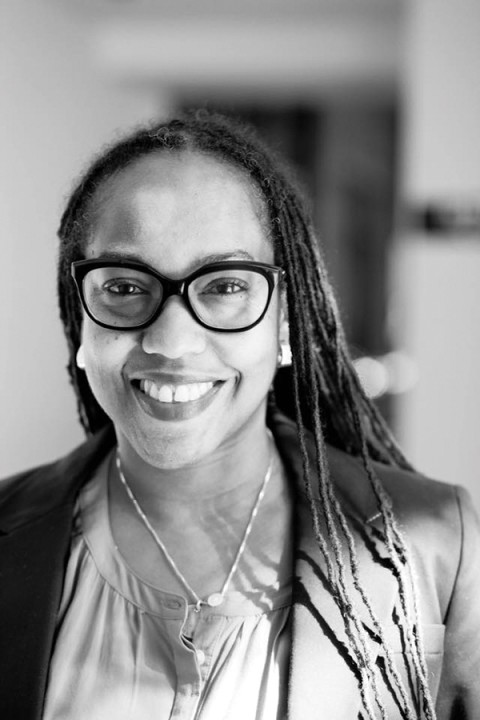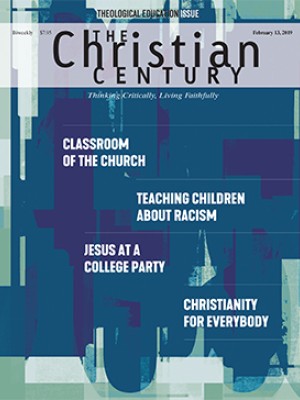Writing poetry as a step toward common ground
“My workshops are not designed to create poets. I am using poetry as a catalyst.”

Jacinta White, a poet in Winston-Salem, North Carolina, started the Word Project as a way to help youth tell their stories through poetry. She conducts workshops designed to bridge social divisions through poetry. She has worked in jails, hospitals, schools, churches, and corporate settings. She has worked with forensic police officers and ex-offenders. She is the publisher and coeditor of Snapdragon: A Journal of Art and Healing.
You have said that poetry belongs at the center of our conversations about current events. Why poetry?
Poetry allows for persons to access their deeper thoughts and emotions, positive or negative. It uncovers what often lies dormant. This unsurfacing—and the acknowledgment of it—is what starts the healing.
I often work with people who have not found the space in society or themselves in which they can talk about their fears, sadness, and pain. People are afraid to be vulnerable. Poetry can create a safe space for people who feel harmed or oppressed to be able to creatively tell their story, without someone saying it’s right, wrong, or inaccurate. I tend to believe that you can’t lie and write a poem at the same time.
Read our latest issue or browse back issues.
How does poetry work to bridge divides?
I believe in starting the conversation on common ground, and for me the best way to do that is with a poem. You can start the conversation with a poem, hear people’s perspectives, then introduce the opportunity to write. You can give participants a prompt to write something out of their perspective, addressing an issue such as race or gender equality. Then you can ask them to share their poems with the group.
Sometimes a person will admit for the first time in such a setting that racism exists. Another might say that it doesn’t exist and that black people are just using the race card or can’t get over slavery. It’s a hard conversation to have. But if we don’t acknowledge what we think and feel, I don’t know how we will move forward. We can’t stay there, but that’s where we have to start.
How can the conversation move on from there?
When I was asked by the Truth and Reconciliation Commission in Greensboro, North Carolina, to do a workshop in response to the tensions between police officers and the African American community that stemmed from the riot and murders of 1979, I invited people to write a poem from another person’s perspective. In response, a young African American wrote from a police officer’s perspective. We have to personalize the issues and learn that the other person is human, not the monster that we thought.
Something about writing gets your emotions involved. I see tears and anger when people say something they did not think they could express publicly. And then people from different backgrounds see that they are sharing a similar emotion.
Another exercise I do is have a group write a poem. Everyone contributes a line or a word. That builds community because you’ve created something together. Those tools are a way of processing mentally and emotionally what we may not otherwise be able to do.
Does the quality of the poetry matter?
My workshops are not designed to create poets. I am using poetry as a catalyst for conversation and for healing. But I don’t say, “Tell me what you’re feeling today.” I say, for example, in working with youth, “Write about your favorite color,” and then I ask, “Why is that your favorite color?” Then the conversation can begin.
How did you begin using poetry as a force for healing?
After my father died 22 years ago, I contemplated suicide. On the outside, I looked healthy. I was in graduate school, I had a great apartment and stuff that made people think I was doing well. But I was completely devastated.
Years later, I realized that my poetry had been my lifeline in that time. The painful parts are still a part of my fabric, but with writing I have a greater clarity. It is like fear of a monster: when you finally look at it you think, “Oh, it’s not as big as I thought.” Writing about the pain allows me to process and hold it instead of fearing it’s going to overtake me.
Christians have an ear for stories of redemption in which something starts flawed or broken and ends up reconciled or improved. Is this a narrative that you see in your poetry or in your work?
The poems that get the most emotional response are the ones in which there is no resolution—the ones that are raw and painful at the end. As a culture, we’re rushing to fix things, find a solution: “Sorry you got a divorce—but there’s OkCupid.”
If we don’t take the time to sit with the pain, we end up doing more damage because we haven’t allowed time to yell and grieve and cry. We heal only the surfaces.
You have roots in the African Methodist Episcopal Zion Church and have drawn inspiration from Buddhism and the Quakers. How does your spirituality intersect with your work?
My work is my spiritual practice. I believe that inspiration comes to me through silence and not through chaos. I may write about chaos, but the idea of what to write and how to write comes through stillness and silence.
Writing is one significant way I commune with God. I start with nothing, there’s a blank page or screen and after however long there’s something that surprises me and that may bless someone else or bring someone to tears and make them cry, make them feel something. I want to believe that part of what they’re feeling is part of the Holy Spirit as well. I feel like I’m cocreating with divinity. It’s humbling and makes me giddy.
How do you work with someone whose faith or politics differs from yours?
Being present with someone who is in pain is the biggest gift that I can give. Healing comes through their words and their tears and their poems. As long as we only listen to our favorite news channels or read our favorite newspapers or listen to our favorite journalists, then we’ll stay on one side and won’t understand the other side.
What’s next for your work?
At this moment I have a collection of poems being reviewed by an editor. My hope is to have that book of poems, based on my research of southern African American cemeteries and churches, published next year.
As a poetry facilitator, I dream about using poetry in disaster relief. When there’s a traumatic event, the Red Cross is deployed to assist with primary needs. That’s also an opportunity for artists to go in. Poetry doesn’t change the situation, but it provides a sense of comfort and can help people walk through the situation.
I also see using poetry as part of national dialogues and town hall meetings. We need to leave time for creating and collaborating. When you’re collaborating on a creative project, you come up with answers you didn’t know exist. Can you imagine the president and Congress doing this?
A version of this article appears in the print edition under the title “Poetry as a force for healing.”





